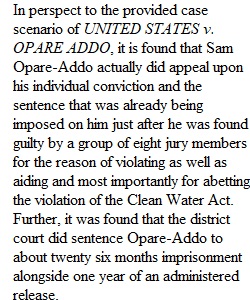


Q Attached Files: UNITED STATES OF AMERICA V. SAM OPARE-ADDO.pdf (131.094 KB) Read the United States of America v. Sam Opare-Addo case and answer the following questions • What is Opare-Addo’s argument on appeal? • According to the Court, what was the one question it needed to answer/resolve in order to sustain Opare-Addo’s conviction? Specifically, what did the evidence need to support?• The evidence at trial showed that Opare-Addo’s was “actively involved in directing the discharges and had taken steps to prevent MCES’s discovery of the illegal activities.” The Court also stresses that “Opare-Addo was more than a passive observer of the illegal discharges. [He] admitted to investigators that he knew about the illegal dischargers, but he claimed that he had voiced objections to them.” Even if this claim was credible, would Opare-Addo been compelled to go farther than just voice objections to the illegal discharges? For example, would he have a legal duty to report this activity? How about an ethical duty?• Finally, the Court’s opinion details other behavioural facts about Opare-Addo such as his stomping out of the building after the EPA informed him that discharging untreated waste was not acceptable, and also the assertion that Opare-Addo hire an illegal alien. Are these facts pertinent to this case and if so how?• Reflecting on how these factors may have affected the Court’s decision, what can you conclude about the role of credibility in business and environmental law?
View Related Questions